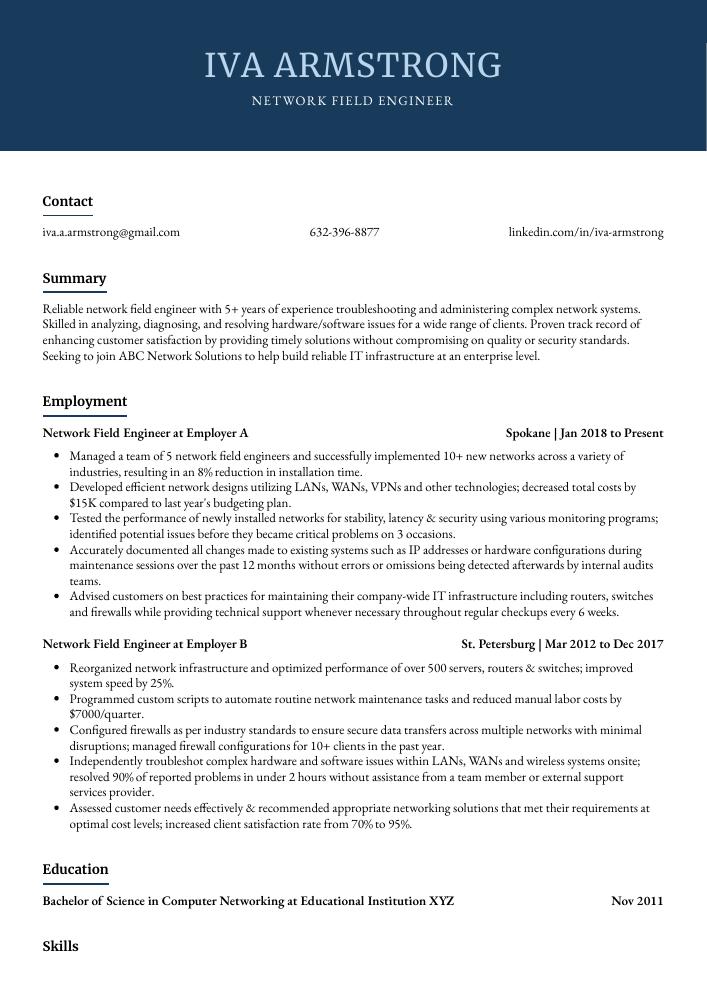Network Field Engineer Resume Guide
Network field engineers are responsible for the installation, maintenance and repair of computer networks. They diagnose any network problems that occur, as well as test the performance of the system to ensure it is working properly. Additionally, they provide support and guidance on how to use a network correctly.
Your technical knowledge and experience in the field of networking is unparalleled. To get noticed by employers, you must write a resume that highlights your skillset and accomplishments as a network engineer.
This guide will walk you through the entire process of creating a top-notch resume. We first show you a complete example and then break down what each resume section should look like.
Table of Contents
The guide is divided into sections for your convenience. You can read it from beginning to end or use the table of contents below to jump to a specific part.
Network Field Engineer Resume Sample
Iva Armstrong
Network Field Engineer
[email protected]
632-396-8877
linkedin.com/in/iva-armstrong
Summary
Reliable network field engineer with 5+ years of experience troubleshooting and administering complex network systems. Skilled in analyzing, diagnosing, and resolving hardware/software issues for a wide range of clients. Proven track record of enhancing customer satisfaction by providing timely solutions without compromising on quality or security standards. Seeking to join ABC Network Solutions to help build reliable IT infrastructure at an enterprise level.
Experience
Network Field Engineer, Employer A
Spokane, Jan 2018 – Present
- Managed a team of 5 network field engineers and successfully implemented 10+ new networks across a variety of industries, resulting in an 8% reduction in installation time.
- Developed efficient network designs utilizing LANs, WANs, VPNs and other technologies; decreased total costs by $15K compared to last year’s budgeting plan.
- Tested the performance of newly installed networks for stability, latency & security using various monitoring programs; identified potential issues before they became critical problems on 3 occasions.
- Accurately documented all changes made to existing systems such as IP addresses or hardware configurations during maintenance sessions over the past 12 months without errors or omissions being detected afterwards by internal audits teams.
- Advised customers on best practices for maintaining their company-wide IT infrastructure including routers, switches and firewalls while providing technical support whenever necessary throughout regular checkups every 6 weeks.
Network Field Engineer, Employer B
St. Petersburg, Mar 2012 – Dec 2017
- Reorganized network infrastructure and optimized performance of over 500 servers, routers & switches; improved system speed by 25%.
- Programmed custom scripts to automate routine network maintenance tasks and reduced manual labor costs by $7000/quarter.
- Configured firewalls as per industry standards to ensure secure data transfers across multiple networks with minimal disruptions; managed firewall configurations for 10+ clients in the past year.
- Independently troubleshot complex hardware and software issues within LANs, WANs and wireless systems onsite; resolved 90% of reported problems in under 2 hours without assistance from a team member or external support services provider.
- Assessed customer needs effectively & recommended appropriate networking solutions that met their requirements at optimal cost levels; increased client satisfaction rate from 70% to 95%.
Skills
- Cisco Networking
- Network Security
- Firewall Configuration
- Network Troubleshooting
- Network Design
- WAN Technologies
- Network Automation
- Linux/Unix
- Virtualization
Education
Bachelor of Science in Computer Networking
Educational Institution XYZ
Nov 2011
Certifications
Cisco Certified Network Professional (CCNP)
Cisco Systems
May 2017
1. Summary / Objective
A resume summary for a network field engineer should be concise and to the point. It should provide an overview of your professional experience, technical skills, certifications, and any other qualifications that make you stand out from the competition. For example, you could mention how many years of experience in networking engineering you have; list relevant certifications such as CCNA or MCSE; describe your ability to troubleshoot complex hardware issues quickly and efficiently; or highlight any awards or recognition received for outstanding performance.
Below are some resume summary examples:
Diligent network field engineer with 8+ years of experience in building, maintaining and troubleshooting wired/wireless networks. Experienced in deploying users onto local area networks (LANs), wide area networks (WANs) and virtual private networks (VPNs). Recognized for efficient installation of network equipment across multiple sites while meeting tight deadlines. At XYZ, reduced customer support requests by 40% due to proactive maintenance activities.
Amicable and highly experienced network field engineer with over 10 years of experience in troubleshooting, installation, and maintenance of intricate telecom networks. Skilled at providing technical support to remote customers for complex networking issues. At XYZ, successfully led a team of 5 engineers and improved their response time by 25%. Responsible for configuring, testing, and deploying all new hardware/software upgrades company-wide.
Hard-working and dedicated network field engineer with 5+ years of experience in troubleshooting and resolving customer issues quickly. Experienced in cabling, installation, configuration, maintenance, monitoring and testing of networks. Adept at using the latest technologies to ensure optimum performance for large-scale corporate infrastructures. At XYZ Solutions successfully completed over 500 onsite service requests within tight deadlines.
Detail-oriented network field engineer with 7+ years of experience in diagnosing and troubleshooting network issues. Known for successful implementation of complex solutions, such as high-availability networks and distributed systems. Successfully deployed over 100 routers across multiple sites for XYZ Company. Received “Outstanding Service Award” from ABC Corporation for installing a VoIP system that reduced costs by 16%.
Talented network field engineer with 8+ years of experience in installation, configuration and troubleshooting of LAN/WAN networks. Experienced in providing onsite support to clients; deploying cabling, routers, switches and firewalls; optimizing network performance through proactive monitoring and maintenance. Proven track record for successfully managing projects from start to finish while meeting budget requirements.
Seasoned network field engineer with 10+ years of experience managing networking hardware, software, and security configurations in multiple sites. Proven ability to coordinate between various departments for successful installations. Experienced in troubleshooting network issues and maintaining core infrastructure components. Looking to apply expertise at ABC Tech as the lead Network Field Engineer.
Professional network field engineer with 5+ years of experience in the telecoms industry. Specializing in designing, installing, and troubleshooting networks for large-scale corporate environments. Recently implemented a new VoIP system that improved call quality by 40%, while also cutting costs by 28%. Seeking to leverage expertise at ABC Company to deliver reliable network solutions and services.
Determined and skilled Network Field Engineer with 5+ years of experience in deploying, maintaining, and troubleshooting large-scale networks. Experienced in providing onsite technical support for routers/switches as well as configuring DNS/DHCP servers. Seeking to join ABC Company to leverage extensive knowledge of network architectures and protocols for the benefit of their clients.
2. Experience / Employment
In the experience section, you should list your employment history in reverse chronological order. This means the most recent job is listed first and then followed by previous roles.
Stick to bullet points when writing this section; doing so makes it easier for the reader to digest what you have written quickly. You want to provide detail on each role, explaining what you did and any quantifiable results that were achieved as a result of your work.
For example, instead of saying “Installed network hardware,” you could say, “Successfully installed 10+ routers per week across various sites using industry-standard tools such as Cisco IOS.”
To write effective bullet points, begin with a strong verb or adverb. Industry specific verbs to use are:
- Configured
- Installed
- Troubleshot
- Monitored
- Optimized
- Resolved
- Implemented
- Tested
- Upgraded
- Analyzed
- Documented
- Managed
- Secured
- Programmed
- Diagnosed
Other general verbs you can use are:
- Achieved
- Advised
- Assessed
- Compiled
- Coordinated
- Demonstrated
- Developed
- Expedited
- Facilitated
- Formulated
- Improved
- Introduced
- Mentored
- Participated
- Prepared
- Presented
- Reduced
- Reorganized
- Represented
- Revised
- Spearheaded
- Streamlined
- Structured
- Utilized
Below are some example bullet points:
- Prepared detailed network diagrams and documentation for over 150+ LAN/WAN systems to ensure accurate troubleshooting of any operational issues; reduced system downtime by 12%.
- Resolved complex technical problems involving routers, switches, firewalls and other network devices in a timely manner; decreased customer complaints about slow internet connection speed by 20%.
- Upgraded existing networks with newer technologies such as fiber optics cables and wireless access points to increase the data transfer rate up to 10% faster than before.
- Formulated strategies for ensuring maximum security across all client-server networks via virus scans, firewall settings adjustments & regular patch updates; improved overall security rating from “medium” to “high” within 3 months of work.
- Efficiently identified trends in user support requests which enabled more proactive solutions instead of reactive ones – resulting in a reduction of recurring incidents by 30% year on year.
- Implemented network configurations for over 150 corporate clients, resolving a variety of IT issues and significantly reducing network downtime by 20%.
- Optimized the performance of local area networks (LANs), wide area networks (WANs) and wireless networks using advanced testing tools; enhanced system speed by 25% on average.
- Represented company in client meetings to assess network needs & develop effective strategies for installation, maintenance & troubleshooting processes; successfully closed deals worth $50K within a year.
- Proficiently managed multiple projects simultaneously while adhering to all safety protocols during site visits and installations; saved up to 8 hours per project due to superior time management skills.
- Facilitated training sessions with new hires on basic networking principles such as IP addressing, subnetting & routing protocols etc., resulting in more efficient team members within 2 months of joining the company.
- Mentored six junior-level engineers in troubleshooting and repair of network systems, increasing team efficiency by 38%.
- Expedited onsite repairs for over 500 client networks within a 2-month period, resulting in an average turnaround time reduction of 7 hours.
- Resourcefully implemented new software upgrades to ensure all customer hardware met industry standards with minimal disruption; successfully completed the project ahead of schedule by 40%.
- Presented innovative solutions to clients at local conferences and tradeshows that offered increased security protocols while reducing overall cost expenditures by $10,000 annually.
- Reduced incident response times from 3 days to less than 12 hours through automation scripting and optimized monitoring processes across multiple sites nationwide.
- Competently troubleshot network issues and resolved them in a timely manner, reducing downtime by 70% within the last year.
- Revised and optimized existing local-area networks (LANs) to guarantee secure access while maintaining optimal performance levels; increased download speeds on average by 25%.
- Introduced new technologies such as wireless routers, switches, firewalls and VoIP systems into various companies’ IT infrastructures, resulting in an estimated cost savings of $15K per annum for each client.
- Achieved expert proficiency with multiple network operating systems including Unix/Linux distributions & Windows Server 2008/2012 through rigorous hands-on training sessions over 10+ hours every week.
- Consistently provided exceptional technical support services to over 200 corporate customers across 5 states – resolving their queries successfully within the first call itself 95% of the time.
- Monitored and maintained a network of 500+ endpoints, troubleshooting and resolving connectivity issues while diagnosing any underlying hardware or software errors to minimize downtime.
- Coordinated with vendors in order to purchase necessary equipment for network upgrades; reduced operating costs by 18% over the past year.
- Compiled weekly reports on system performance, analyzing data points such as latency, packet loss & throughput levels before making recommendations for potential improvements across the entire infrastructure.
- Substantially increased security protocols throughout the organization by implementing firewalls and other defense mechanisms which have prevented malicious attempts from infiltrating confidential information since their installation 3 months ago.
- Documented all changes made to each device within the network environment according to industry best practices; improved visibility into complex configurations leading to faster resolution times when problems arise (+25%).
- Structured and deployed complex network systems for 10+ clients, increasing their operational efficiency by 15%.
- Successfully installed and configured over 60 wireless routers, modem/router combinations and firewalls across multiple locations in the past year.
- Utilized advanced troubleshooting techniques to diagnose malfunctions quickly and resolve hardware & software issues in a timely manner; reduced repair costs by 25%.
- Demonstrated expertise with TCP/IP protocols, Ethernet networks and security solutions; successfully implemented preventive measures that minimized system downtime from an average of 8 hours to 4 hours per month.
- Developed comprehensive documentation outlining installation procedures as well as maintenance best practices which helped accelerate new employee onboarding process by 30%.
- Effectively maintained and configured corporate networks, ensuring 99.9% uptime and boosting productivity by 15%.
- Streamlined network operations across multiple sites by successfully installing over 200 routers/switches within 24 hours of being onsite.
- Diagnosed complex technical issues related to Wi-Fi connections, VoIP systems and LANs; resolved 80% of problems in less than 2 hours with minimal disruption to business processes.
- Analyzed system logs for potential security threats daily, detecting malware attacks early before any data loss occurred; improved overall cyber security posture by 17%.
- Spearheaded a project involving the upgrade of existing hardware infrastructure from 10gbps to 40gbps which was completed ahead of schedule – saving $12K in costs for the organization.
- Secured network service contracts for 10+ clients, resulting in a 15% increase in revenue from the previous year.
- Participated in the installation of 50+ new systems and networks across multiple sites; reduced downtime to less than 30 minutes per site on average.
- Reliably maintained existing hardware and software infrastructure at 20 customer locations, ensuring that all security protocols were enforced strictly according to company policy guidelines; decreased network outages by 45%.
- Improved system performance through proactive monitoring & troubleshooting of network issues such as latency, bandwidth congestion and lost connections; achieved an overall improvement rate of 25%.
3. Skills
The skillset employers require in an employee will likely vary, either slightly or significantly; skimming through their job adverts is the best way to determine what each is looking for. One organization may be looking for a candidate with experience in configuring Cisco routers while another might require expertise in managing Linux systems.
By tailoring the skills section of your resume to each job that you are applying for, you can increase the chances of it being seen by an employer. This is because many employers use applicant tracking systems these days, which scan resumes for certain keywords before passing them on to a human.
In addition to listing relevant skills here, try and discuss some of them in more detail elsewhere; this could be done either through describing past experiences or providing examples from projects completed during university/college courses.
Below is a list of common skills & terms:
- Cisco Networking
- Firewall Configuration
- Linux/Unix
- Network Automation
- Network Design
- Network Monitoring
- Network Security
- Network Troubleshooting
- Virtualization
- WAN Technologies
4. Education
Mentioning your education on your resume will depend on how far along you are in your career. If you just graduated and have no prior experience, include an education section below your resume objective. However, if you have been working as a network field engineer for several years with plenty of responsibilities to showcase, omitting the education section is perfectly fine.
If including an education section, try to mention courses or subjects related to the role of network field engineer that may be relevant to the job position you are applying for.
Bachelor of Science in Computer Networking
Educational Institution XYZ
Nov 2011
5. Certifications
Certifications are a great way to demonstrate your expertise in a certain field and can be an important factor for employers when considering you as a candidate. Having certifications on your resume shows that you are knowledgeable, have taken the initiative to learn more about the industry, and have kept up with current trends.
Including any relevant certifications in this section of your resume will help show potential employers that you are qualified and dedicated to staying informed within the profession.
Cisco Certified Network Professional (CCNP)
Cisco Systems
May 2017
6. Contact Info
Your name should be the first thing a reader sees when viewing your resume, so ensure its positioning is prominent. Your phone number should be written in the most commonly used format in your country/city/state, and your email address should be professional.
You can also choose to include a link to your LinkedIn profile, personal website, or other online platforms relevant to your industry.
Finally, name your resume file appropriately to help hiring managers; for Iva Armstrong, this would be Iva-Armstrong-resume.pdf or Iva-Armstrong-resume.docx.
7. Cover Letter
Submitting a cover letter alongside your resume is a great way to show potential employers that you are the right fit for their role. Cover letters give hiring managers an insight into who you are and what makes you unique.
A cover letter typically consists of 2-4 paragraphs and should be customized for each job application, as it allows recruiters to get a better understanding of who you are and why they should hire you. Writing one is not always necessary but highly recommended due to its ability to make your profile stand out from the crowd!
Below is an example cover letter:
Dear Malvina,
I am writing to apply for the position of Network Field Engineer at XYZ Company. As a highly skilled and experienced network engineer, I am confident that I would be an excellent fit for your organization.
In my current role as a network engineer at ABC Company, I have gained extensive experience in designing, implementing, and troubleshooting complex networks. My technical skills include a deep knowledge of routers, switches, and firewall configuration; experience with load balancers and VPNs; and expertise in various networking protocols such as TCP/IP, BGP, OSPF, MPLS, etc. In addition to my technical skills, I also possess strong project management abilities and have successfully led multiple large-scale projects from start to finish.
I am excited about the opportunity to join XYZ Company as it is one of the leading providers of networking solutions in the industry. My combination of technical skills and project management experience will enable me to contribute significantly to your organization’s success. I look forward to discussing this opportunity with you further during an interview at your earliest convenience. Thank you for your time and consideration.
Sincerely,
Iva
Network Field Engineer Resume Templates
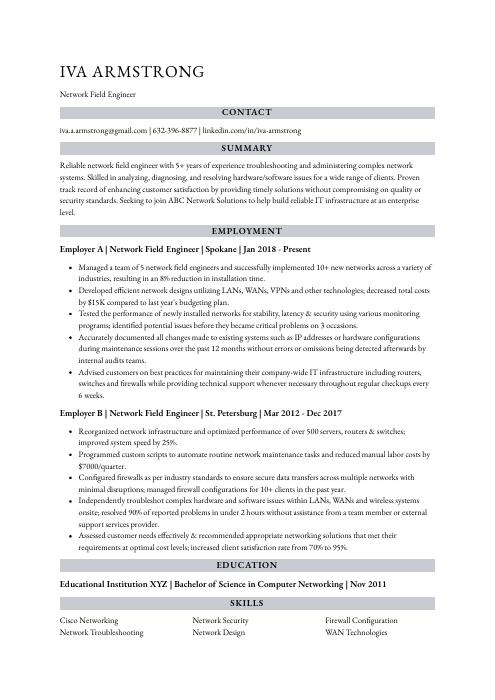 Numbat
Numbat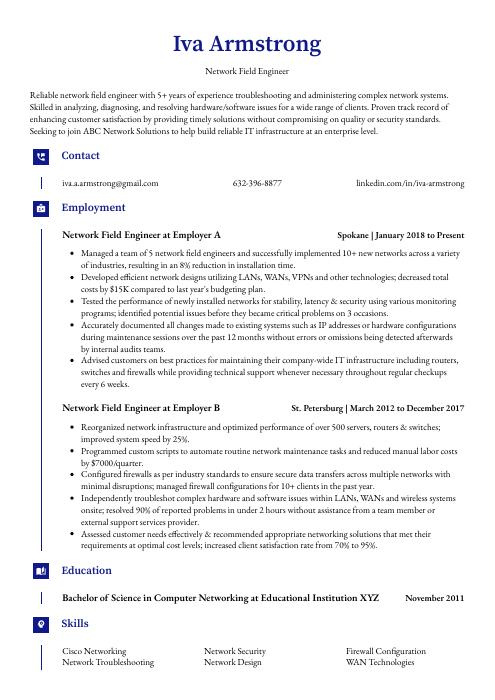 Gharial
Gharial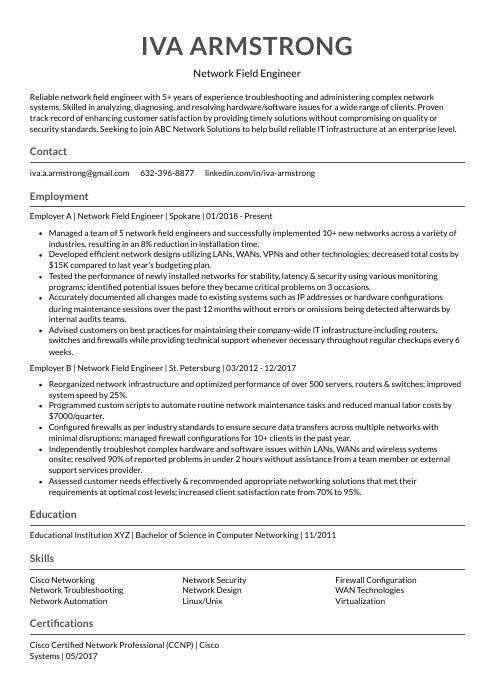 Indri
Indri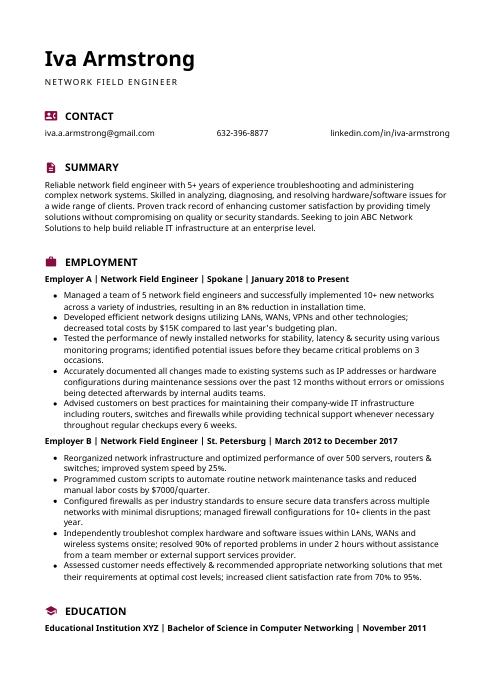 Hoopoe
Hoopoe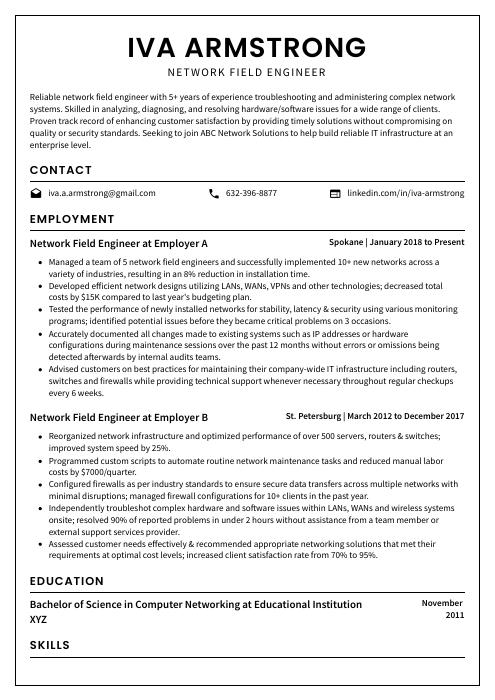 Cormorant
Cormorant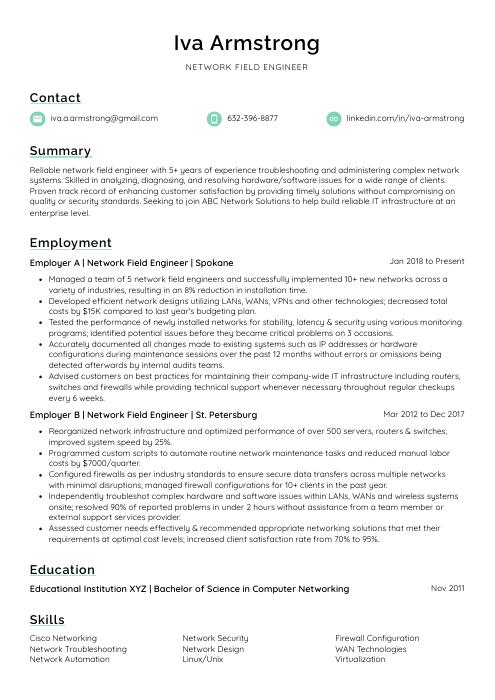 Lorikeet
Lorikeet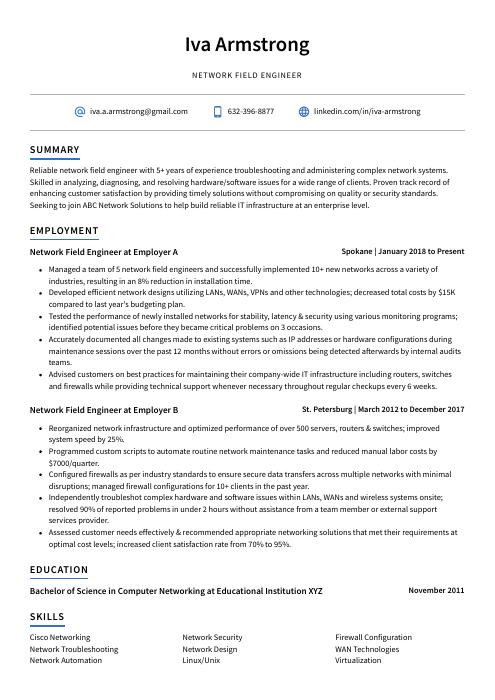 Axolotl
Axolotl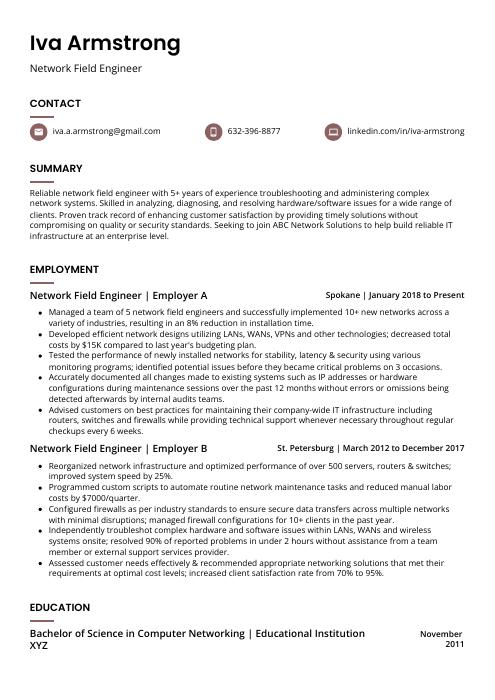 Fossa
Fossa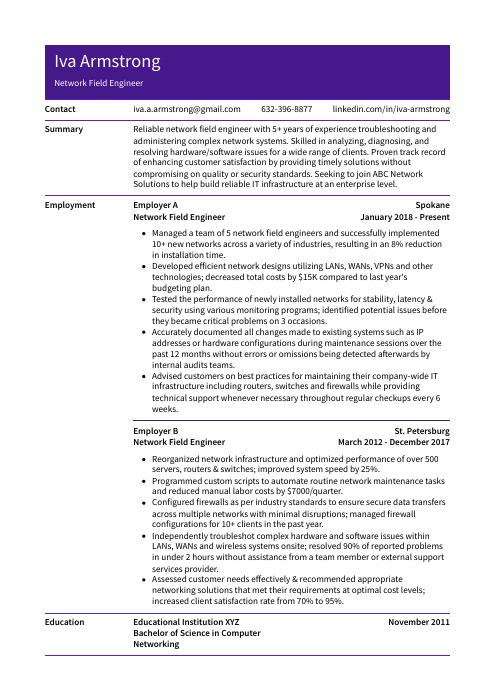 Pika
Pika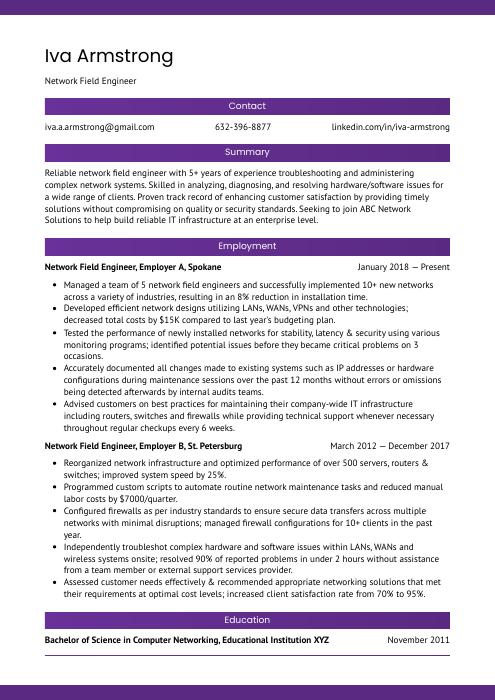 Jerboa
Jerboa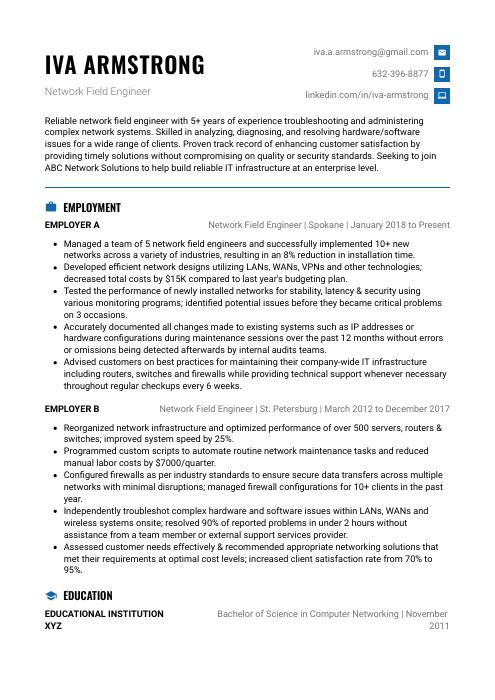 Echidna
Echidna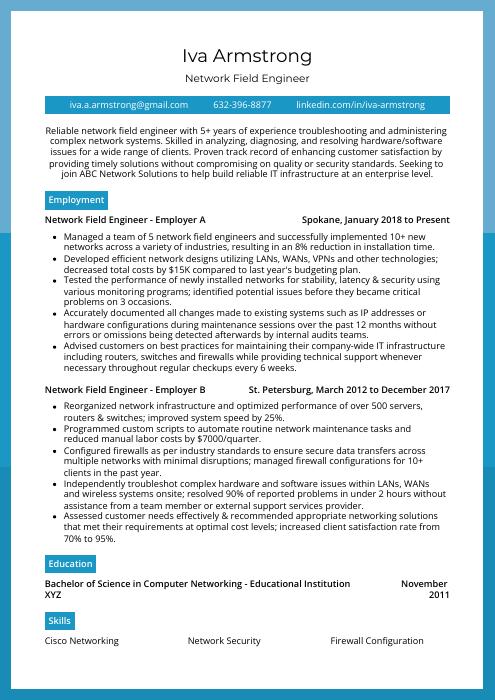 Rhea
Rhea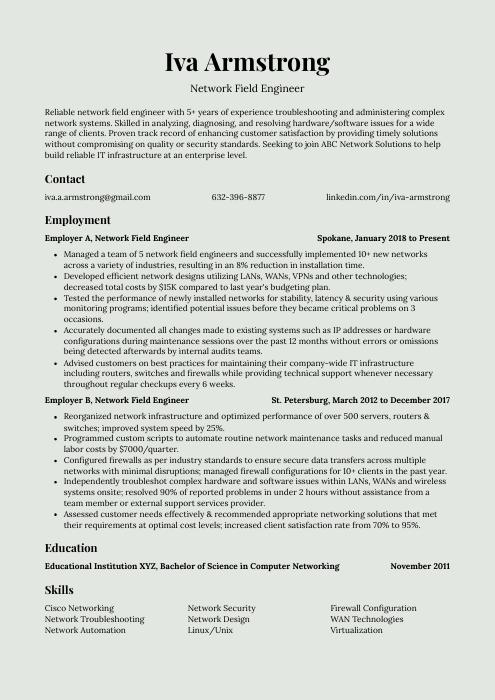 Saola
Saola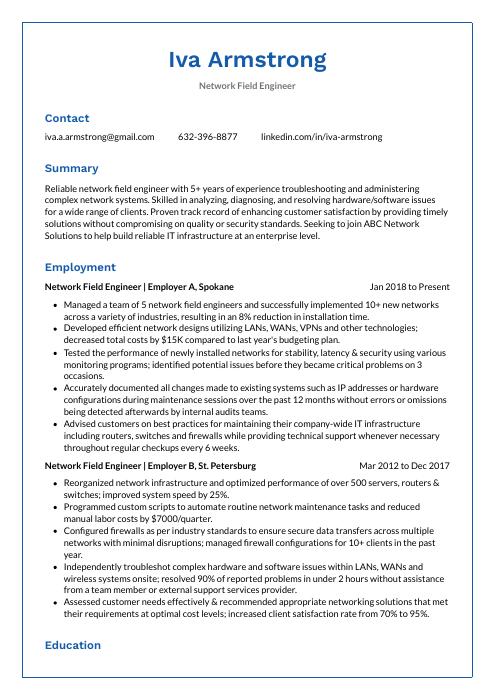 Markhor
Markhor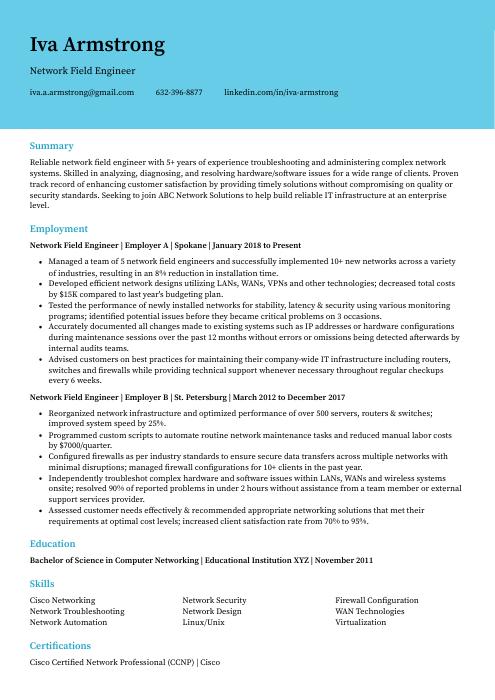 Dugong
Dugong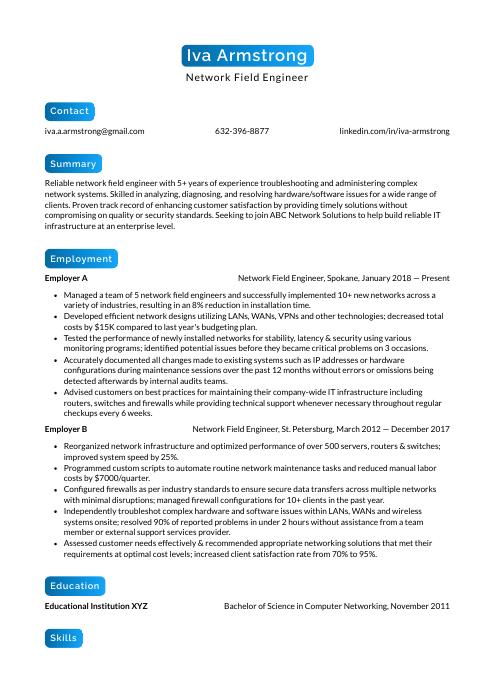 Kinkajou
Kinkajou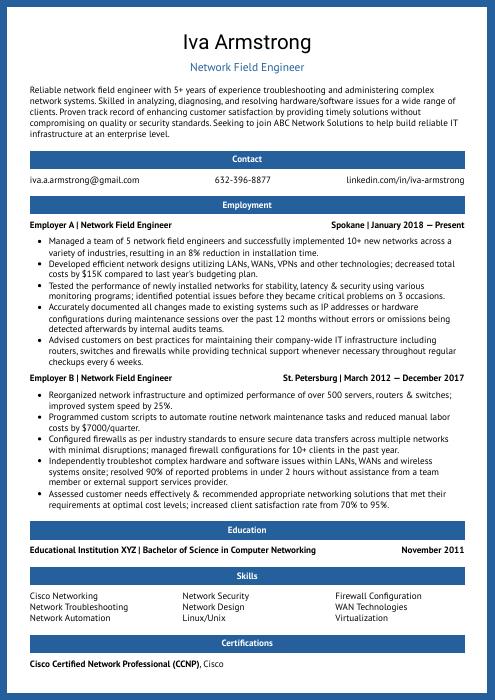 Ocelot
Ocelot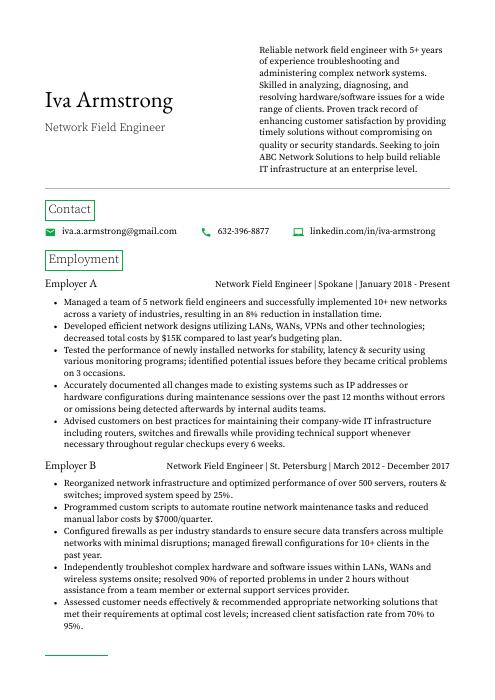 Quokka
Quokka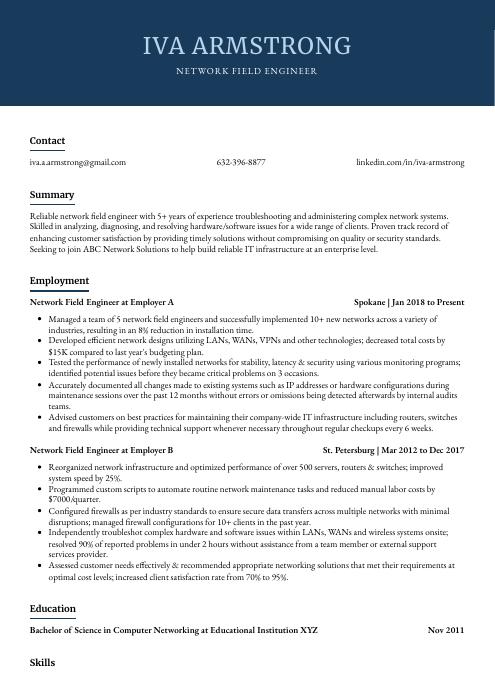 Bonobo
Bonobo Rezjumei
Rezjumei
